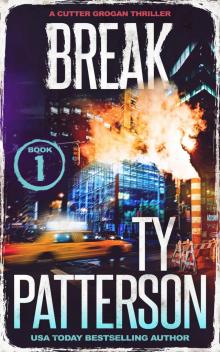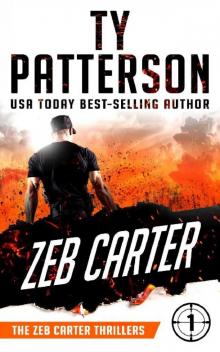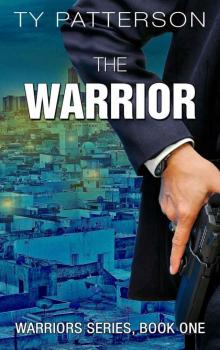- Home
- Ty Patterson
The Peace Killers Page 2
The Peace Killers Read online
Page 2
Then it was their language. They spoke Turkish with the servers, occasionally Arabic with other patrons. But when together, when whispering, they spoke Hebrew.
He followed them and found they practiced exceptional tradecraft. They paused several times, appearing to be window-shopping, but Zeb knew they were checking out their six. They used the mirrors of parked vehicles, detoured elaborately.
He could think of only one agency whose operators were this good and who spoke Hebrew.
Mossad.
Of course, they would be interested in a Pakistani nuclear scientist’s movements.
Zeb tailed them to their hotel. A shabby, rundown one like his. Their room was on the ground floor, just as his was. Good operatives chose the lower floors. They enabled quicker exits.
He broke into their room on the fourth day, when they were away, and wasn’t surprised when he didn’t find much, initially.
His bag. Her bag. No brightly lettered identification cards that said they were Mossad agents.
No surveillance equipment. No weapons.
He stood in the center of the room and surveyed it. Walked toward the bathroom. A loose floorboard moved under his weight.
He looked down.
Carpeted floor.
But an almost invisible crack in the fabric.
He bent down, pried it open, tested the board beneath it and discovered the treasure trove.
Two Glock 17s, several magazines, knives, surveillance gear.
He laid back the board, adjusted the carpet and waited behind the door.
It was confrontation time.
Chapter Three
Jerusalem
Present Day
* * *
Shiri held the elevator door open for Magal and pressed the button for the ground floor. He wasn’t worried about prints. Both men were wearing adhesive pads on their fingers and, before leaving their apartment, had wiped it clean. They wouldn’t be returning to it again.
He held the door open for Magal, and to any onlooker it would have looked like an act of politeness. A young man helping an old woman.
The old woman turned right when she reached the street, trudging slowly. Shiri donned shades and looked in her direction casually, until she turned a corner and disappeared from sight.
He walked a hundred yards and came to a parked vehicle, a white Skoda, bearing the logo of a taxi company. He turned off the yellow sign on the roof and drove out.
He headed down Hazefira Street, turned left on Yehoshafat Street, went toward the Museum of Natural History, where he circled round to join Emek Refaim, the main drag of German Colony.
He parked on the street opposite the entrance to a luxury hotel. Lowered the sun visor, leaned back in his seat and half-closed his eyes. A cab driver resting between jobs.
An hour passed. Traffic picked up. Tourists walked past. A uniformed cop strolled past, glancing at Shiri. The cab driver didn’t react. The taxi was the real deal; his driver credentials would stand up to any scrutiny.
At ten am he stirred and made a show of rubbing his eyes and yawning lustily.
Half an hour later, there was movement at the hotel’s entrance.
A couple came out of the revolving doors and stood outside. The man was bearded and dressed in an ill-fitting suit. The woman was slim, in a dress, and was laughing. Two men came behind them and waited.
A Range Rover drove up. The couple climbed down the steps, greeted the driver and settled into the back.
Another Range Rover arrived. The two men, who looked like heavies, got inside.
The two vehicles left, the couple’s vehicle in the lead.
‘They are coming your way,’ Shiri murmured.
* * *
Maryam Razak snorted a laugh at Farhan Ba’s joke and wriggled back in her seat in the first Range Rover. The two of them had this routine.
They went out for a drive after breakfast, a brief spin through German Colony, the city center, further if there was time, or else they returned to the hotel. The outing cleared her mind and prepared her for the day ahead. Farhan? She had a sneaking suspicion he came along with her just for her company. That flattered her, but she wasn’t looking for a relationship.
She whipped out her make-up kit and reapplied her lipstick, listening as Farhan talked about the previous day.
Their vehicle slowed. It came to a stop.
She flicked her eyes up.
A pedestrian crossing. An old woman walking slowly, hunched, a bag in her hand.
Maryam and Farhan and the rest of them had been briefed about security. The vehicle behind them had their protectors.
She saw no reason to be alarmed by an elderly woman getting to the other side of the street. Maryam went back to her lipstick while Farhan fidgeted beside her.
He gasped. She didn’t look up, dabbed the corner of her mouth with her forefinger.
He yelled. Fright in his voice. She jerked her head up. Her eyes widened when she took in the scene.
The old woman had stopped in the middle of the street. She had whipped out something long and metallic from her bag.
Their driver was cursing and reversing when a starburst pattern appeared on the windshield. A hole appeared. More of them. Maryam screamed when she realized what was happening. The driver slumped forward. Their vehicle yawed to the left.
The old woman came to their right. Windows shattered. Farhan shuddered and jerked. Something hit Maryam. She looked down, amazed at the red blossoming on her blouse. She felt like she was underwater, everything was moving so slowly. Her mouth opened to scream when she looked up and saw a cannon, the weapon’s barrel, trained on her.
Maryam Razak didn’t see anything else.
* * *
Magal moved swiftly and cut down the occupants from the second vehicle as they lunged out of their Range Rover. They were police officers, trained, but not as well-trained as he. They fell before any of them could reach for a weapon.
He threw the MAR, moving fast down the pavement. There was screaming on the streets. Pedestrians fled. Cars swerved and their occupants cowered. He saw movement from the corner of his eye. A driver raising his hand, holding a cell phone. The man ducked when he felt Magal’s eyes on him.
Ahead, he saw the white Skoda, a barely perceptible trail of exhaust coming out of its pipe. He broke into a jog when he heard the wail of sirens in the distance.
He glanced back briefly. A few people had gathered around the wreckage of the two vehicles. At least two hands were pointing at him, but no one made any move toward him.
The Skoda was moving as he reached it. He opened the rear door, jumped in, and Shiri took off with a squeal of tires.
Magal removed his wig and the mask over his face and ripped the dress away as Shiri took the first left, then right, straight ahead and another left. A residential street.
The Skoda stopped behind a van parked on the street. The two men got out, moving in controlled haste, and went down the line of parked vehicles.
Shiri opened the driver’s door to a dusty Volkswagen and slid inside. He reached beneath his seat and extracted a mustache from a plastic bag. He attached it to his upper lip and looked at Magal, who nodded.
Shiri nosed out of the parking space, circled back and joined the growing line of traffic on Emek Refaim. People were bunched on the pavement. Huddled together. Heads bent, talking softly as if they could be overheard.
Magal lowered the window and snatches of conversation floated in.
‘Six people shot …’
‘Old woman …’
‘No, that must be a disguise …’
‘Escaped …’
Their VW came to a stop at a police cordon. A bunch of cops, alert-eyed, hands on weapons, approached them.
Shiri lowered his window and answered their questions respectfully.
They were office workers. He pointed to the briefcases in the rear seat. They were already late to the office.
Did the cops want to see their identity cards
?
No, they didn’t.
Did Shiri or Magal see anything suspicious?
The police officers directed them to a detour and waved them away.
Magal drew out his phone when they were heading away.
He went to a social media app.
‘Now?’ he asked his partner.
‘Yes.’
Magal typed out a single sentence.
Mossad Killers Assassinate Palestinian Peace Negotiators.
And with that, the Middle East exploded.
Chapter Four
Kadikoy, Istanbul
Three Days Before
* * *
Zeb heard their voices at the door two hours later.
The woman was arguing with the man, words indistinct, but the tone was unmistakable.
The door swung open into the room. She entered, followed by the man.
Zeb had lowered his chi, slowed his breathing, had made his consciousness almost undetectable.
He was the wall. He was the room.
The woman tossed her bag onto the bed and loosened her hair. The man headed to the bathroom. She loosened her shirt and turned.
And saw the old man at the door.
She didn’t shout or scream. She dived toward the bed, her hands outstretched, reaching for her bag.
The man whirled. His hand dipped toward his waist.
The woman shoved her hand inside the bag.
Started drawing out her Glock.
The man’s weapon started rising.
Zeb shot into the mattress.
The report was loud in the room, despite his silenced Glock 41.
‘I am a friend,’ he said in Hebrew, his eyes taking them both in. He was alert, ready for any move. Body armor beneath the shirt he wore.
I hope I’ve guessed right about them.
The couple didn’t respond. Their eyes were wary. Their hands still gripping their weapons. The woman lay at an acute angle, heels digging into the floor, left hand braced against the bed, right gripping her gun, her body in the air.
She was breathing evenly despite the unnatural pose.
She would, if she’s a kidon.
‘I could have killed you,’ Zeb tried again, mildly. ‘I didn’t. That should give you a clue. My language as well.’
‘Who are you?’ the man demanded.
‘He was at the café,’ the woman replied.
Zeb watched them watching him.
Time to take a leap of faith.
He bent down slowly and placed his gun on the floor.
‘I’m friendly,’ he repeated in Arabic, just in case he had misheard them.
Their Glocks came up and trained on him. Neither fired.
He moved his hands slowly and removed his wig and the prosthetic mask. ‘You saw me yesterday, as well.’
‘No,’ the woman replied, in Hebrew. ‘We would have noticed. The regulars were pensioners who look nothing like you. They play chess. They’re harmless.’
Zeb saw a flicker of emotion cross her face.
Harmless. She knows she shouldn’t have said that word. A stranger would wonder at its choice.
‘Did you see the old woman who was carrying a Food Bazaar bag? She sat close to you and sipped her tea noisily?’
The stillness in them gave them away. They had noticed the woman.
‘You’re from Mossad? To assassinate Hussain?’
A muscle twitched on the man’s face but no word escaped them.
Zeb sighed. ‘Look, I told you. I am not a threat. We both are after the same person. We can work together … but if you’re here to kill Hussain, then we’re not friends.’
‘We don’t know any Hussain. We are not from Mossad,’ the woman replied.
Looks like she’s the khuliyot leader.
‘I’m sure you can explain those Glocks you’re carrying. And those beneath the floorboards, as well as the other gear.’
They didn’t explain.
His hand slid inside his pocket and he withdrew his phone carefully.
He dialed a number, and when a voice came online, he put the phone on speaker.
‘Avichai,’ he said loudly, eyeing the two agents, ‘I am with two of your kidon. I think.’
‘My kidon? Where are you, Zeb?’
‘Kadikoy. In a hotel room. With a male and a female who’re pointing their guns at me. If they’re not your people, then I am a dead man.’
Levin didn’t respond.
‘Why are you there, Zeb?’
He’s not denying their existence.
‘I’m tracking Uzair Hussain. I noticed your operatives. I think we both have the same objectives. It’s better if we work together … unless your people are working on a wet assignment. In which case, we’re on opposite teams.’
‘Hang up. Stay there.’
Zeb hung up.
A phone buzzed. The female patted her pocket and withdrew her cell.
She brought it to her ear, her gaze still on Zeb. ‘Ken?’ Yes.
She listened intently for a while, nodded, turned away and spoke softly. She handed the phone to her partner when she had finished. The man listened as well, grunted an acknowledgement and hung up.
Zeb couldn’t help grinning when the two stood motionless for a moment, expressionless.
‘I bet you two haven’t done this before. Worked with someone else on a mission.’
‘You’re American?’ the female asked, flatly.
‘Zeb Carter. Avichai might have told you about me.’ He deliberately used Levin’s first name to convey the relationship he had with the ramsad.
It didn’t have the desired effect. Neither of the two introduced themselves.
‘You speak our language well,’ the female kidon stated.
‘I’m sure you speak English fluently.’
‘What is your mission?’ the man tucked his weapon in his waist and stood beside his partner.
‘You aren’t going to make this easy for me, are you?’ Zeb picked up his Glock and holstered it. ‘I want to know what Uzair Hussain is up to.’
‘You’ll grab him?’ The female operative still held her gun.
Looks like she’s less trusting than her partner.
‘No. I plan to bug him. What about you?’
She didn’t say anything until the man nudged her.
‘You know who he’s meeting?’
‘I can make a guess. Kamran Shahi, the Iranian nuclear—’
‘We know who he is.’ The female kidon finally put her gun away in her bag and turned toward him.
‘I am Riva. He is Adir.’
No handshakes. No second names.
‘You’re kidon?’
No reply. Standard operating procedure for Mossad’s deadly operatives.
‘What is your mission?’ Zeb asked.
‘Grab Hussain. And Shahi.’
Chapter Five
Jerusalem
Present Day
* * *
Prime Minister Yago Cantor was still in his residence in Beit Aghion, in Jerusalem, when news of the shooting filtered out.
He normally headed to his office at seven am, but that day had stayed back for several meetings.
He had just finished a briefing with his public security minister, Jessy Levitsky, when an aide knocked on the door and rushed in without an apology or a greeting.
‘You’ve got to see this.’ He picked up a remote and turned on the TV.
Cantor’s face paled when he read the scrolling banner beneath the images of the shooting.
‘That hotel … that couple,’ he whispered.
‘Those are the Palestinian negotiators,’ Levitsky replied grimly.
‘No one knew about them. How did it happen?’
‘I’ll find out.’
The prime minister leaned against his desk, following the news, while Levitsky, whose department oversaw the police, left the room, speaking softly in his cell phone.
Already, the Islamic countries were saber-rattling. Jordan and Egy
pt, Israel’s immediate neighbors, had threatened military action if Israel didn’t identify the killers quickly.
Saudi Arabia’s defense minister had upped the country’s alert level.
A phone trilled. The aide picked it up, listened, cupped the receiver and looked at Cantor.
‘It’s the American ambassador.’
‘I thought she was on vacation.’
‘She is, sir. She’s calling from the U.S.’
‘I’ll call her back.’
The aide murmured in the phone and left the room. Yago Cantor muted the TV, rubbed his eyes and passed a hand over his thinning hair.
He was powerfully built and had a personality to match. He looked around his home office, at the pictures of various prime ministers hanging on the wall. Some with families, others with American presidents or alone in the photograph.
A quotation by David Ben-Gurion, the first prime minister of the country, caught his eye.
In Israel, in order to be a realist, you must believe in miracles.
* * *
Cantor was a pragmatist. He was the leader of his right-wing party, had held together his coalition government through no-confidence motions, and was in his second term.
He had welcomed the U.S. administration’s Jerusalem embassy move. He also knew how that would affect the Palestinians and had set his plan in motion: bringing the Palestinians to the peace table, because he didn’t want to see subsequent generations of Israelis warring with their neighbors.
It hadn’t been easy.
Many in his party had criticized him. They said he was going soft. That the Palestinians had shown their true nature during the failed peace talks of 2014.
Cantor used his charm. He cajoled and persuaded, threatened and swore. He outlined the bigger picture. Surely everyone wanted lasting peace. Did anyone want to see terrorist attacks in Israel?
‘Do you want to see that for the rest of your lives?’ he challenged his party members, pointing to the TVs on the wall, which showed the scenes in Gaza. That was the Palestinians’ fault, his party roared back.

 Terror: Zeb Carter Series, Book 4
Terror: Zeb Carter Series, Book 4 Powder Burn
Powder Burn Gemini Series Boxset
Gemini Series Boxset RUN!
RUN! Break
Break Zeb Carter
Zeb Carter Wrecking Team_A Gripping Mystery Suspense Novel
Wrecking Team_A Gripping Mystery Suspense Novel The Warriors Series Boxset II
The Warriors Series Boxset II The Reluctant Warrior (Warriors Series Book 2)
The Reluctant Warrior (Warriors Series Book 2) Wrecking Team
Wrecking Team The Warrior (Warriors Series Book 1)
The Warrior (Warriors Series Book 1) Dividing Zero
Dividing Zero The Warriors Series Boxset I
The Warriors Series Boxset I The Peace Killers
The Peace Killers Wrecking Team: A Gripping Mystery Suspense Novel (Gemini Series of Thrillers Book 4)
Wrecking Team: A Gripping Mystery Suspense Novel (Gemini Series of Thrillers Book 4) Death Club
Death Club Trigger Break
Trigger Break